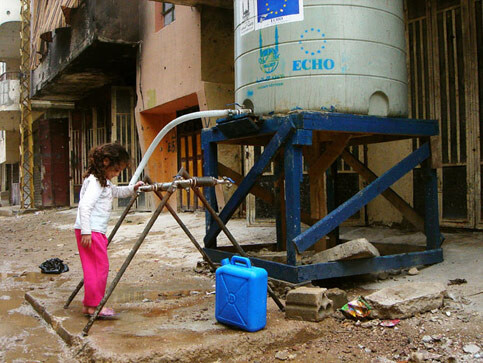Electronic Lebanon 6 March 2008

The repaired water supply has yet to be connected to homes in the new camp, so residents must collect water for washing and cooking from temporary tanks. (Hugh Macleod/IRIN)
BEIRUT, 6 March 2008 (IRIN) - The International Committee of the Red Cross (ICRC) has completed rebuilding the primary water supply network in currently accessible areas of the ruined Nahr al-Bared Palestinian refugee camp, north Lebanon.
Up to 90 percent of the water infrastructure in the areas of Nahr al-Bared outside the official boundary of the “old camp” was damaged or destroyed in a 15-week battle in the summer of 2007 between the army and Islamist militants, according to the ICRC.
The conflict reduced the “old camp” — the original square kilometer of cinder block houses which comes under the jurisdiction of the UN Palestinian refugee agency, UNRWA — to rubble, and also inflicted huge damage on the new camp, where Palestinians had built homes on land rented from local Lebanese.
The US $300,000 four-month ICRC project laid down 2,700 new sections of pipes and provided two generators to power water pumps to pump water from the four wells and three reservoirs, one of which was repaired, that will serve the camp’s total population of up to 40,000 people.
Just under 1,500 families have returned to the new camp since sections of it were opened in October. The old camp remains closed while the army continues clearing unexploded ordnance.
Technical challenges
Working outside the official camp boundary posed technical challenges, said ICRC’s Paul Henri Bourlon, who coordinated the project.
“The main technical challenge was gathering all the details of the existing water infrastructure,” he said. “The network was built in a piece-meal way and this is the first time all the technical data has been put together in one file.”
The technical file on the new water network in the new camp has been handed to UNRWA engineers, but as yet it remains unclear who will take the lead in the secondary phase of connecting the supply network to houses.
UNRWA has no mandate to work outside the official boundaries of any of Lebanon’s 12 Palestinian camps.
UNRWA spokeswoman Hoda al-Turk told IRIN, however, that the issue of connecting the water supply was under discussion and that if no non-governmental organization (NGO) were to agree in the coming days to tackle the work, UNRWA would undertake it.
Plan to finish camp by August 2010
Launching a reconstruction plan last month, UNRWA and the Lebanese government said that rebuilding the old camp should be completed by August 2010 and put the cost at US $173 million. UNRWA will not undertake any reconstruction of homes in the new camp.
On 3 March UNRWA inaugurated a third prefabricated school, funded by the German government, in an area adjacent to Nahr al-Bared. The two other schools are in neighboring Baddawi camp, where most refugees fled the fighting in Nahr al-Bared.
Nearly all the sewage system in Nahr al-Bared was also damaged in the conflict, according to Ahmed Waked, a water sanitation engineer for UNRWA. Some 5,000 meters of pipes were broken, of which the Islamic Relief organization have repaired over 1,500 meters.
With the repaired water supply yet to be connected to homes in the new camp, residents must collect water for washing and cooking from temporary tanks.
This item comes to you via IRIN, a UN humanitarian news and information service, but may not necessarily reflect the views of the United Nations or its agencies. All IRIN material may be reposted or reprinted free-of-charge; refer to the copyright page for conditions of use. IRIN is a project of the UN Office for the Coordination of Humanitarian Affairs.
Related Links


